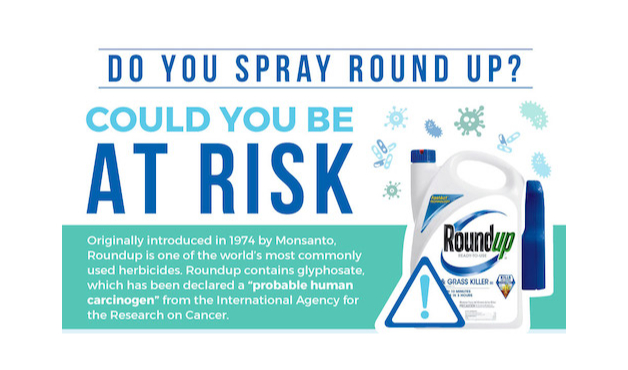In our daily lives, we are coming into contact with thousands of chemicals that we know almost nothing about. Most of these chemicals are harmless in small doses, but others have the potential for adverse health effects. (NTP.gov) In fact, it is estimated that 2000 new chemicals are introduced into the market each year. (YourGreenPal.com)
One of these many chemicals, Glyphosate is linked to a range of diseases and illnesses, and we are being exposed to it every day, sometimes without realizing it. It’s “in the lawns, gardens and homes of America. It is at your child’s school. Worst of all it’s even in the food you eat!” Glyphosate, a weed killer, is the most widely used herbicide in the United States. (USNews.com) Glyphosate is the main active ingredient in Roundup, which Mansanto began selling in 1974.
In 2017, glyphosate was recognized as a probable human carcinogen by the World Health Organization (WHO).
In United States courtrooms, over 9,000 cases are being heard linking Monsanto Company’s (now Bayer’s) Roundup to several types of cancer, autism, birth defects, chronic kidney disease, liver disease, heart disease, and numerous other illnesses.
The most common illness associated with Roundup is non-Hodgkin’s lymphoma, which has led to nearly 9,300 lawsuits against Monsanto. Non-Hodgkin’s lymphoma is a “blood cancer that affects the lymph nodes and tissues, and sometimes even bone marrow. Some studies have suggested that frequent glyphosate exposure could double the risk of developing lymphoma within a decade.”
“The first two trials ended with juries ruling that Monsanto’s weed killer was a substantial contributing factor in causing the plaintiffs to develop non-Hodgkin’s lymphoma, and giving large awards for liability and damages…. “For news and tips about the ongoing legislation, see Carey Gillam’s Roundup Trial Tracker.” (USRTK.org)
Are you at risk?
These groups of people are most at risk for exposure to Roundup, because they use it frequently, often as part of their jobs:
- Professional gardeners
- Landscapers
- Farmers
- Agricultural workers
- Herbicide applicators
- Groundskeepers
There are three ways you can be exposed to Roundup:
- Breathing it in through the nose or mouth
- Eating food treated or tainted with it
- Absorbing it through the skin
Signs and Symptoms of Roundup Exposure:
- Eye irritation
- Skin rashes
- Nausea
- Dizziness
- Sore throat
- Asthma
- Headache
- Lethargy
- Nose bleeds
If you have any of these symptoms after being chronically exposed to Roundup, please start a dialogue with your physician.
How to protect yourself from harmful exposure:
- Wear sturdy rubber gloves
- Wear safety glasses
- Wear socks and close toed shoes
- Wear long-sleeve shirts and long pants
- Make sure the sprayer you’re using is not leaking
Contact David L. Hood if You’ve Been Exposed to Roundup in South Carolina
If you or someone you love has been exposed to Roundup on a regular basis, and now has an illness that is known to be linked to exposure, please schedule a free consultation with attorney David L. Hood by calling (843) 491-6025 or filling out our brief online contact form.
We know how difficult it can be to deal with the effects of product defect-related injuries and the untold pain and suffering they cause. At The Law Offices of David L. Hood, we work hard to protect your rights and make things simple for you and your family so you can focus on healing. After a free case evaluation, attorney David L. Hood, co-counsel, and our team of experts will vigorously pursue your case to get you the best result we can achieve. Let us put years of experience to work for you!
*Clients are not liable for any expenses unless there is a recovery in their case; however, if there is a recovery in their case, clients will be liable for expenses. Attorney’s fees are based on a percentage of the recovery, which will be computed before deducting expenses.
Additional online resources used for this article:
https://www.ecowatch.com/15-health-problems-linked-to-monsantos-roundup-1882002128.html





